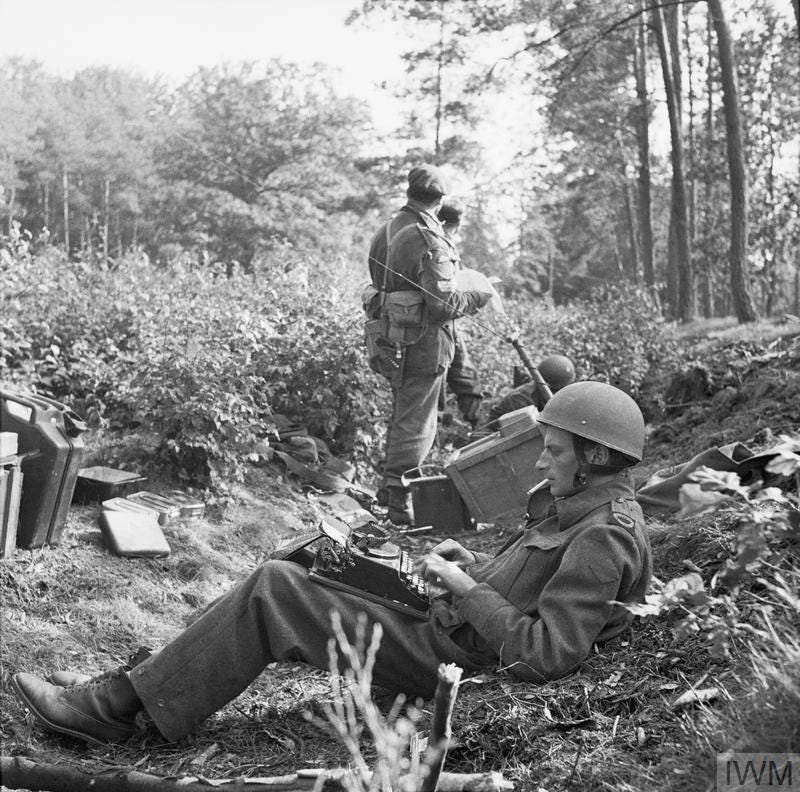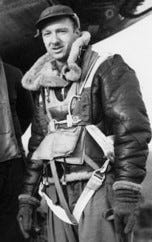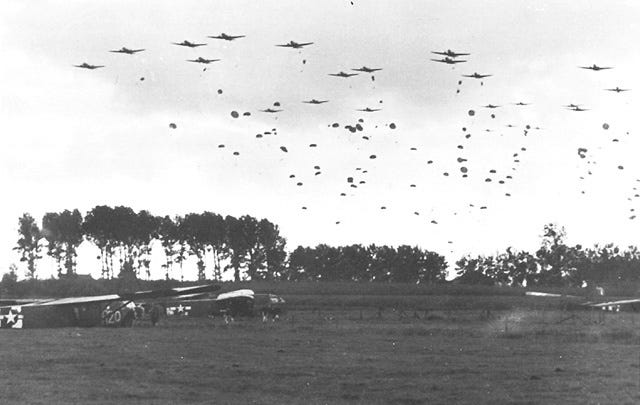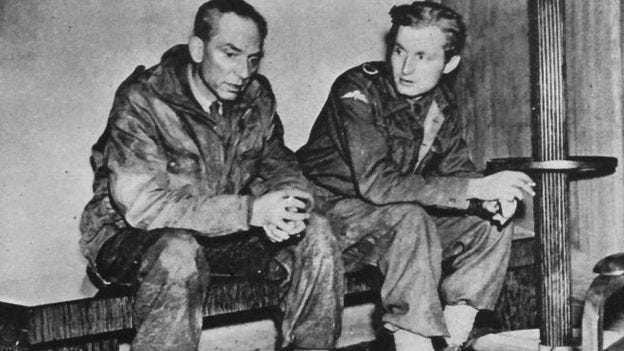Operation Market Garden: Dropping into Holland
As far as Walter Cronkite could tell, the opening hours of Operation Market Garden had been a smashing success.
The 27-year-old United Press correspondent filed his initial dispatch from the Netherlands, "near the German frontier," at 4:40 p.m. on September 17, 1944. Cronkite had arrived in-country via glider with troops from the 101st Airborne, which along with the 82nd Airborne and British 1st Airborne landed nearly 35,000 men that day. Cronkite's story began:
Thousands of Allied parachutist and glider troops landed behind the German lines in Holland today, liberated village after village from enemy troops, who fled in panic before them, and as I write are pushing on to their first big objective which they expect to reach by nightfall.
The optimistic tone of Cronkite's report was typical of initial dispatches from correspondents on the ground and in the air. Compared to the scattershot chaos of the D-Day parachute operation, this daylight landing was smooth, and optimism was high.
Numerous correspondents tagged along on C-47s and Halifaxes dropping and towing the men into action, and their reports were even sunnier. The Yorkshire Post's air war correspondent concluded his front-page account of a trip on a glider-towing Halifax that gave him "a ringside seat at one of the most important operations of the whole war" with these paragraphs:
It was plain that our troops had the situation well in hand.
On the way home we talked about the whole show over the intercom, and we still could not understand how it had been so uneventful. We were nearly two hours over enemy territory, flying low and at a slow speed, but not once were we attacked from the land or in the air.
Too good to be true? Well, yes. The reality was of course more complicated, even in Cronkite's world. His description of the landing in his 1997 memoir A Reporter's Life was a bit more ... earthy:
The plane did a half flip, the dirt came pouring in, our helmets went flying off. I was with a headquarters company of about fourteen men. We dug ourselves out of the dirt. I grabbed a helmet and slapped it on my head. There was some enemy fire. Gliders collided overhead, spilling their guns and human cargo around us.
I crouched and ran toward what I thought was our rendezvous point -- a drainage ditch at one side of the large landing zone. I glanced behind me, and there, apparently following me, were several men. One of them shouted: "Hey, Lieutenant, are you sure we're going in the right direction?"
I shouted back that I wasn't a lieutenant; I was a war correspondent. With a full GI vocabulary of unrepeatable words he advised me, rather strongly, that I was wearing a helmet with an officer's big white stripe down its back. It was the only chance I had to lead troops in the whole war. I didn't do badly. the drainage ditch was that way.
Market Garden was to be Gen. Bernard Montgomery's master stroke, allowing Allied forces to charge across the Rhine toward Berlin while cutting off the Ruhr and its vital war production.
The plan was complicated enough on paper, requiring lightly armed airborne troops to capture and hold a series of bridges while awaiting a linkup with British armor and infantry for the grand push past the Rhine. In practice, it wasn't long before everything began to fall apart for the Allies.
The initial shock of the invasion did indeed chalk up some early successes, but the German defenders quickly regained their footing and drove the Allies back, resulting in one of the most costly setbacks of the war. As the situation on the ground deteriorated, the tone of dispatches from the correspondents in the thick of the fighting followed suit -- even with censorship factored in.
Australian-born reporter Alan Wood, representing London's Daily Express, parachuted in west of Arnhem with the 1st Airborne. His initial report recalled those sent earlier in the summer from newly liberated towns in France, Belgium and the Netherlands.
Near by, strangely enough, is a lunatic asylum, and one of the nurses has come to greet us. She keeps on saying "How do you do" -- the words of English she has been ready to say for the last four years.
There are tears in her eyes. More civilians are now coming up, most of them dumb and tongue-tied. They just insist on shaking hands with everyone.

Those villagers' relief would be short-lived. Scattered British troops around Arnhem and Oosterbeek faced significant opposition from SS Panzer troops and quickly ran short on food and ammunition.
By September 19, aerial resupply efforts were underway but largely unsuccessful, with some supplies dropping behind enemy lines. Stanley Maxted of the BBC had landed near Oosterbeek in a glider and told the increasingly desperate story of the 1st Airborne troops on the ground there. He wrote this newspaper dispatch on September 20:
In the nearby town Germans are sniping from houses -- even sniping the medical parties. The fighting is the most relentless I've ever seen. There is no quarter. That is the way it has to be.
Yesterday when the supplies were dropped we watched some of the aircraft burst into flames, and it wasn't funny. A hundred-odd German prisoners stood near and watched, too -- and they thought it was.
Thankfully, another air drop found its target later on the 20th, a moment recorded by Maxted for posterity. The blend of exhaustion and relief is evident in his voice throughout his BBC report:
All around them, confusion reigned. The same day, in the same area, Alan Wood summed up the struggle to understand what was happening -- not only in the bigger picture but in his immediate surroundings:
Desperate fighting has gone on all day under the heaviest American mortaring. The Germans, mainly S.S. men, are resisting vigorously.
We can now hear the rumble of where others of our men are fighting. It is getting louder and louder as we close in together and squeeze the Germans between. Somebody shouted suddenly, "They're through." "Who?" we cried. "German tanks through or Allied forces coming to link up with us."
We investigated. No, it was not the Germans. And the other force was also not through yet though they were getting nearer already and we can pick up their first wireless signals faintly.
Wood and his colleagues continued to hold out hope on the morning of the 22nd, maintaining their resolve amid the misery. In a dispatch with a 9 a.m. dateline, Wood wrote:
In this patch of hell, our men are holding the few civilian houses that still stand.
An old lady in black stumbled out of one of them a few minutes ago, and a British soldier ran out and put his arm around her. She collapsed, and he carried her down to safety in a cellar.
It is now just five days and five nights -- sleepless -- since we flew out from England. God knows from what secret source of strength these fighting men have drawn the guts which has kept them going.
Only one thing is certain -- they will keep going until the British Second Army gets here.
Though those reinforcements came close -- within earshot, even -- the 1st Airborne ultimately was left to fend for itself. As the days ground on, Wood's admiration for the men fighting around him only grew.
On September 24, the day before they finally were ordered to retreat across the river toward Nijmegen to try and save themselves, Wood composed his famous epitaph to the ill-fated engagement:
I can't yet write the full story of all they have done and endured, but if in years to come any man says to you, "I fought with the Arnhem airborne force," be sure you take your hat off to him and buy him a drink, for his is the stuff of which England's greatness is made.
The few of Arnhem will rank in glory with the few of the Battle of Britain.
Along with Wood, Stanley Maxted and Guy Byam of the BBC joined those troops in retreat. And like his press counterpart, Maxted's summary of the excursion in a September 27 broadcast invoked "the few" who had saved Britain four years earlier.
In his piece, the 50-year-old Maxted recounted the mixture of relief and disappointment that lay over "the last of the few" who made their escape to fight another day.
I walked up to one young lieutenant to ask him about his sergeant -- a stout lad if there ever was one -- and he started to explain what had happened and then turned away. Remember, all of these men have been practically 10 days and 10 nights under the most murderous concentrated fire I have seen in two wars.
Then he turned again and said: "It's hell to be pulled out when you haven't finished your job, isn't it?" That's the way they all felt. It doesn't occur to them that if they hadn't held the horde of enemy force at Arnhem, that force would have been down at Nijmegen upsetting the whole apple cart.







